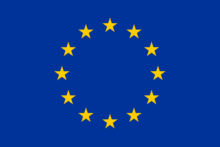Normative Power Europe Meets Israel
A Talk by Dr. Hila Zahavi, Ben-Gurion University of the Negev
On April 5, 2019, Dr. Hila Zahavi from Ben-Gurion University of the Negev visited CERES to speak about relations between Europe and Israel. Her talk focused on the effect of European normative power in Israel and the extent to which Israelis do and do not feel a connection with Europe. To begin, Dr. Zahavi presented a theoretical framework developed by Ian Manners, in which the latter describes a “Normative Power Europe.” This label indicates how Europe’s position as an attractive partner for cooperation in multiple areas allows it to spread its own norms and models of behavior abroad in a peaceful manner. Some of these core European norms are peace, liberty, rule of law, human rights, and democracy.
Dr. Zahavi then continued to explain how, in the context of Israel, this process plays out through the European Neighbourhood Policy. Israel has shared a maritime border with the EU since 2004, when Cyprus became a member state, and its relations with the organization today encompass a variety of factors. On the cultural level, Israel and the EU share history, certain values, and the prominence of Judeo-Christian religions. Life in Israel today continues to be heavily influenced by the history of the European Jewish diaspora and European anti-Semitism, with many Israeli citizens either qualifying for or even holding citizenship in an EU member state. Israel and the EU also cooperate on the economic level in trade relations, as well as on the military level, for example through NATO, on cybersecurity, and regarding security intelligence. A particularly salient connection is that Israeli researchers have access to European research grants, and Israel ranks among the states that receive the highest number thereof. At the political level, Israel participates in “twinning,” wherein EU delegates assist government bodies in Israel in adopting policies that align more closely with European standards.
Despite these close ties, the Israeli opinion of the EU has declined in recent years. Until 1980, relations between Israel and Europe were very positive, but the Venice Declaration that year marked a major turning point in calling for a solution to the Palestinian problem that would involve the self-determination of the Palestinian people. Since then, Israelis have seen the stance of Europeans on the conflict as non-objective and have increasingly resisted European norms and cultural practices. Relations still remain quite positive on the economic and political front, but there is an increasing drive among Israelis to preserve their own unique culture and remain distinct.
by Daniela Bouvier-Valenta, CERES MA candidate
April 8, 2019
